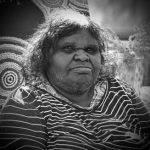24-926 Kapi (Waterhole Story)
About the Artwork
There are many types of waterholes that Anangu can use and they depend on their intimate knowledge of the environment to know where and when they will find water. Sometimes a soakage will have dried up and the women must use their digging sticks to find the water under the surface. They transport it back to their families by carrying it in wooden bowls which are carried on their heads.
Dots and lines are like the patterns of different desert vegetation types and concentric circles linked by lines can represent waterholes and river courses or the traveling and resting places of Creation Ancestors and Anangu.
Anangu follow the traditions of their Tjukurpa or Creation Law within which are coded life survival skills. There is inma or ceremony for all parts of the country in order to teach and celebrate; for people to learn where they fit within both the environment and social systems.
Anangu feel strongly about continuing to teach and learn Tjukurpa and their art is important and vital work. It sustains them economically, physically and culturally. It keeps the stories and traditions alive. Walkatjara Art is the Aboriginal owned and governed art centre belonging to Mutitjulu community, located in the Uluru-Kata Tjuta national Park, NT.



